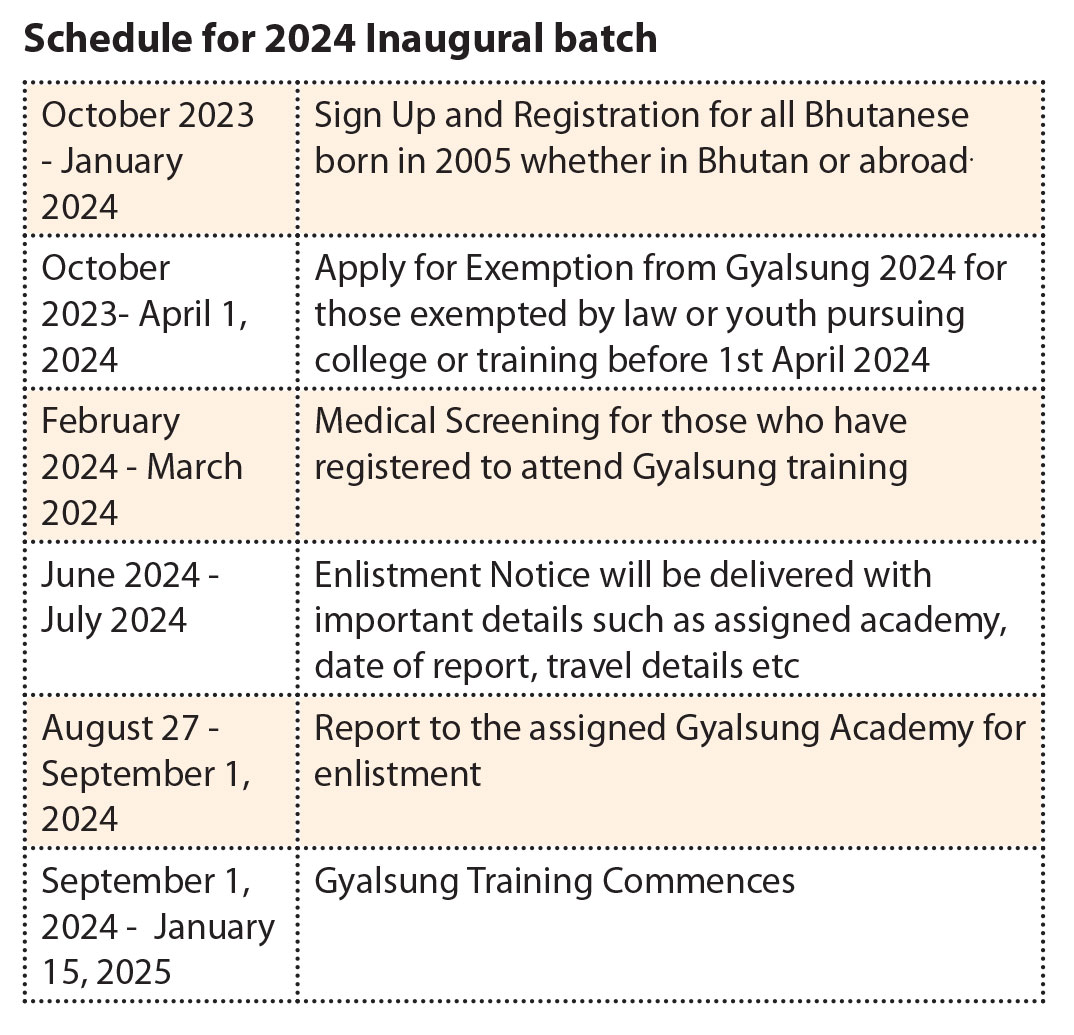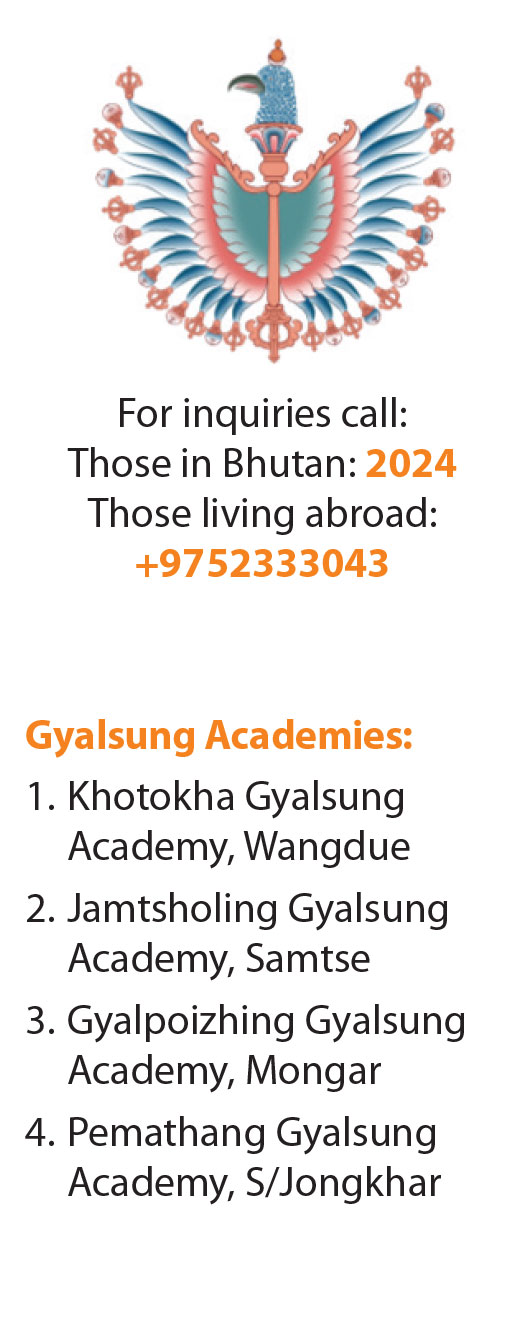… the sign up and registration portal was launched yesterdayWith the launch of the much-awaited Gyalsung National Service website, eligible youths can now sign up and register for the programme.
A total of 338 individuals including 177 girls registered as of 7pm yesterday.
The portal saw registrants from Bhutanese living within the country and abroad.

Gyalsung—Bhutan’s National Service is an important national initiative envisioned by His Majesty The King to build a strong foundation for the future of Bhutan. It was shared in the Royal Address during the 112th National Day on December 17, 2019.
The Parliament enacted the Gyalsung Act on November 11, 2022.

National Service Core Working Group (NSCWG) Chairperson, Dasho Karma Tshiteem said that there are similar national services in other countries. However, what is unique about Bhutan’s Gyalsung programme is that in line with HM’s vision, all Bhutanese youths will be immersed in a shared experience that will strengthen bonds among each other and the country through skills and experience.
Providing life-long skills irrespective of educational, social, regional or linguistic backgrounds is the priority—with the launch of Gyalsung and the first batch next year, all relevant sectors would improve.
“For example, with collaboration with schools, we expect initiation of more programmes that involve physical exercises such as scouting programmes where students are trained on basic drills and disciplines—yet we are hopeful that it is hygienic and safe. All of this is done to prepare them to become fit and sound for the training,” Dasho Karma Tshiteem said.
The courses, he said, the training, engagement and other micro details are all piloted through and well documented. The instructors who are currently under training for the Gyalsung programme must be certified to get the opportunity of being an instructor at Gyalsung academies.
“The academies irrespective of the area they will focus—the academies will provide hands-on training, later they may take up the related job or further join the Technical Training Institutes,” the working group chairperson said.

The first batch of Gyalsung will commence on September 1 next year—which will be a training course of four and half months. The complete one-year training will begin from second batch in 2025—which starts in March and will end in January the following year.
As per the law, all eligible Bhutanese citizens are required to enlist for Gyalsung upon attaining the age of 18.
A Bhutanese citizen born between January 1, 2005, and December 31, 2005, shall sign up and register for Gyalsung Training 2024 irrespective of their education status or place of residence. Those who were born before the cut-off date are not eligible for Gyalsung.
For the first batch—the training shall commence on September 1 and end on January 15, 2025.
The first batch will undergo three months of Basic Military Training (BMT) and one and a half months of National Education, Life Skills, Teamwork and Leadership Skill Development programmes.
As per the Gyalsung Act, —it is mandatory for all eligible Bhutanese whether living in Bhutan or abroad. However, a person enrolled in monastic schools, a person who is deemed medically unfit by the Medical Board, and as a one-time measure for the 2024 intake, a person who is pursuing college education or vocational training after completing class 12 in 2023 may be exempted. However, the person shall be required to sign up and register before seeking an exemption.
The four Gyalsung Academies under construction are Jamtsholing Gyalsung Academy in Samtse, Khotokha Gyalsung Academy in Wangdue, Gyalpoizhing Gyalsung Academy in Mongar, and Pemathang Gyalsung Academy in Samdrupjongkhar.
These academies have the maximum capacity to take in 13,000 participants based on data taken from the health ministry, yet for the first batch, the intake is expected to be around 6,000 as there is an exemption and deferment option. The aim is to take the ones who are eligible but out of school. A short academic recess will be in between the training—making it a ten-month training in particular.
All deferments are granted on a yearly basis. The individual is required to sign up and register for Gyalsung in the appropriate year and then submit an application for deferment at least 6 months ahead of the forecasted enlistment date. However, if the student neither reports for training nor reports to school to repeat school or re-sit for the examination is liable for offence.
If an individual is declared positive for the use of narcotic and psychotropic substances or alcohol during the screening process, the person shall neither be disqualified nor exempted. The individual will receive support to recover in consultation with The PEMA Secretariat and then participate.
For screening the health ministry has identified 26 centers across the country. It is the responsibility of each youth in schools or drop outs to personally complete the sign-up, registration and medical screening within the stipulated time—the medical screening has to be done in Bhutan as authorised by Gyalsung Medical Board.
However, those youths who are overseas can request for the medical screening to be done at a time closer to the enlistment day so that they do not have to travel to Bhutan just for medical screening.
Gyalsung training has been designed as a one-year integrated training programme, which includes three months of basic military training (BMT) in all academies followed by two weeks of national education—the training on a fundamental sense of service and sacrifice will be instilled, one-week immersion programme where they will get to travel across the country.
During the registration, individuals will be given an opportunity to indicate their preference for skilling programmes. However, there is no guarantee that placement in the preferred choice will be granted—this is for equal distribution and placement.
The four core areas of training after the BMT are: Home security—skilling in construction trades, such as carpentry, crafts, shelter and artisan. Food Security—agriculture technology, protected agriculture and drip agriculture in which the scarce resource usage will be taught. ICT Security—this is recognizing the significance of future-based technology such as cyber security, data science and programming, and community security—first responder skills, the training on first-aid, forest fire management, search and rescue, public order and health management.
As per the Act, the governing council, as a one-time measure, shall determine the eligibility criteria for the first batch of Gyalsung cadets.
A person after turning 16 could volunteer for early registration for Gyalsung training with the consent of parents or legal guardians. Those who are still serving prison terms of a third and fourth-degree felony at the time they attain 18 will miss the opportunity.
Gyalsung headquarters yesterday issued notices to eligible persons to register for the Gyalsung programme. A person who evades Gyalsung training commits an offence and shall be liable upon conviction for fourth-degree felony as per the Penal Code.
Upon completion of the one-year training programme, Gyalsups may be called for both mandatory duty and voluntary duty until the age of 35 years. This will be followed by Gyalsung Reserve phase until the age of 45.
After the age of 45, Gyalsung Reservist and the ones who miss Gyalsung may volunteer to join DeSuung.

From Kuensel: https://kuenselonline.com/gyalsung-national-service-registration-begins/

























